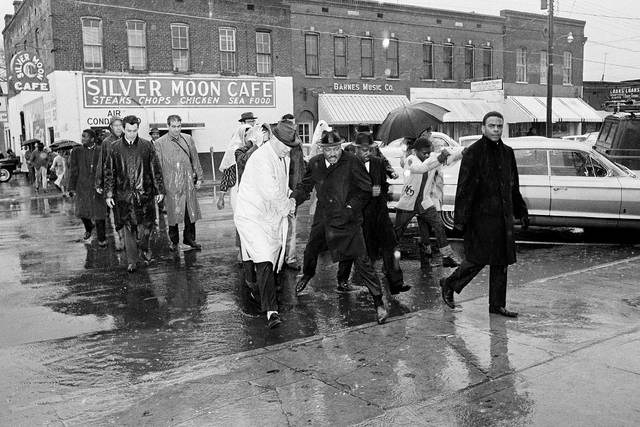Another cellphone video captures the sin of racism, the nation’s slumbering conscience awakens, and political solutions are forcefully advanced. Yet at the most fundamental level, do we not face a moral reckoning demanding a moral diagnosis and a moral cure?
At such moments in our past, the Hebrew Bible, traditionally known to Christians as the Old Testament, has been a wise teacher, speaking a language familiar to virtually all Americans. Today the voice of faith may seem more muted and, to some, less relevant. History, however, shows that the Bible shared by Jews and Christians both enkindles and guides. In our current moral crisis, Scripture once again may help heal our wounded country.
Consider two speeches, beloved and still resonant today. At only 701 words, Abraham Lincoln’s Second Inaugural Address contains 13 references to the divine and six biblical quotations or allusions. Beyond language, the Hebrew Bible/Old Testament supplies Lincoln’s arresting moral theme: In accordance with God’s will, both North and South may be suffering the tragedy of the Civil War in consequence of the sin of slavery. Lincoln calls for Americans to act righteously, “with malice toward none (and) with charity for all,” to care for the wounded, the widow and orphan, and to secure “a just and lasting peace.”
Nearly 100 years later, the Rev. Martin Luther King Jr. delivered the “I Have a Dream” speech. His soaring rhetoric is drenched in Scripture, including the books of Isaiah, Amos and Psalms. The speech concludes with hope for the day when “all of God’s children, Black men and white men, Jews and Gentiles, Protestants and Catholics, will be able to join hands and sing in the words of the old Negro spiritual, ‘Free at last, free at last, thank God Almighty, we are free at last.’ ” This prophetic vision is drawn from the Bible. According to the book of Genesis, God created all human beings, who are thus “God’s children.” According to the book of Exodus, God delivered the Israelite people from bondage in Egypt to freedom in the Promised Land, and they thereby became “free at last.”
Justly iconic, these speeches were but a highlight of two larger historical developments. The 19th-century abolition and the 20th-century civil rights movements, both composed of men and women mostly unremembered to history, were at times unpopular in their own day. Objectives and methods sometimes diverged. Yet the Hebrew Bible/Old Testament communicated the moral imperatives underlying each movement through language cherished by both the powerful and the oppressed.
The abolition movement to end slavery drew heavily from evangelical Protestants, including “America’s Prophet,” orator and former slave Frederick Douglass, and novelist Harriet Beecher Stowe.
The civil rights movement reflected greater religious diversity. Its key leaders and their followers belonged to the Black Protestant Church. African Americans defined the movement, numerically, spiritually and essentially, including through women of faith such as Rosa Parks, a pillar of the AME Church.
Many Jews played significant roles, too. Two of the white Freedom Riders murdered in Mississippi in 1964 were Jewish. Abraham Joshua Heschel, a prominent theologian and Orthodox rabbi, protested that “it was easier for the children of Israel to cross the Red Sea” than it was for a Black person “to cross certain university campuses.” Joined by other rabbis, Heschel marched arm-in-arm with King in Selma, Ala. Father Theodore Hesburgh, president of the University of Notre Dame, did the same in Chicago. With the support of their bishop, Pittsburgh diocesan priests also marched in Selma. So too did other white and Black Catholics, perhaps most notably Sister Antona Ebo, a future president of the National Black Sisters’ Conference founded at Carlow College.
The authors of this essay happen to be an African American Protestant, a Jew and a white Catholic. Together we find guidance in our common Scriptures. Others look elsewhere and thereby enrich us all. The Quran, for example, contains its own profound instructions concerning divine creation, justice and healing.
Christianity and Judaism comprise more than the Hebrew Bible/Old Testament. For Christians, the Gospels of the New Testament provide the core of their faith. Tradition and the magisterium also instruct Catholics. Jews look to their own traditions. Rabbinic teachings such as “repairing the world” (tikkum olem), “social or distributive justice” (tzedakah), “the ways of peace” (darkhei shalom) and “love as action” (hessed) encourage Jews, a small minority, to lead many social justice movements in Pittsburgh and throughout the world.
No religion has a monopoly on moral teachings. Indeed, throughout history, some, such as the Ku Klux Klan, have misused Scripture and religious symbols for unjust ends. Faith must never supplant the role properly assigned to politics, economics and law.
Nevertheless, the Hebrew Bible/Old Testament that propelled the abolition and civil rights movements, that formed Lincoln’s humane vision and that underlay King’s uplifting eloquence, remains instructive for all Americans regardless of race, creed, privilege or political party.
May King’s beautiful and biblically infused words, first delivered to Temple Israel, continue to inspire and unite us all. “Deep in my heart I do believe that we shall overcome. And I believe it because somehow the arc of the moral universe is long, but it bends toward justice.”








